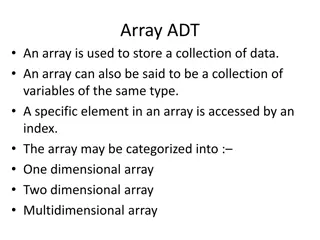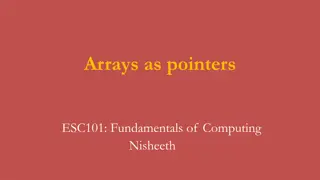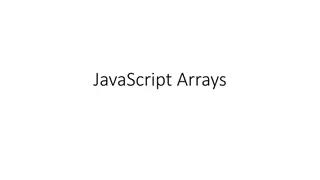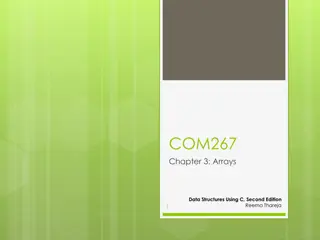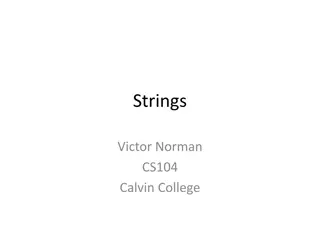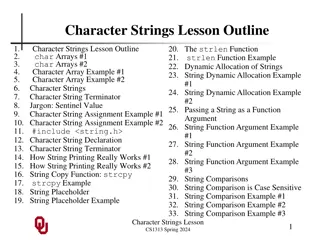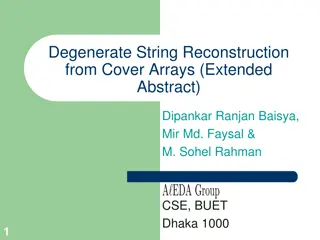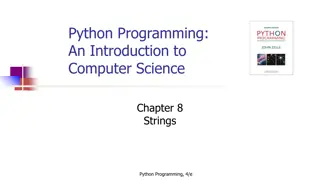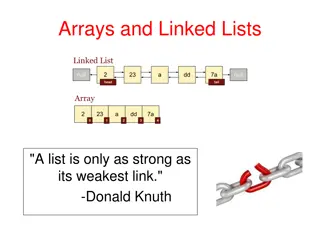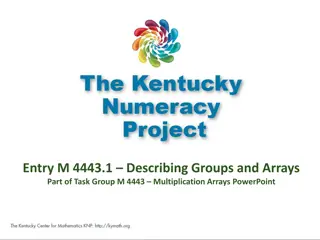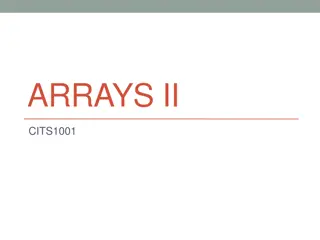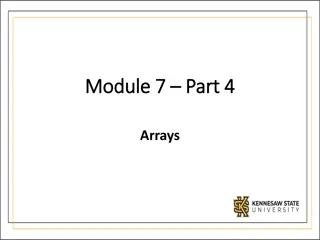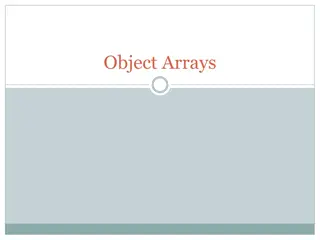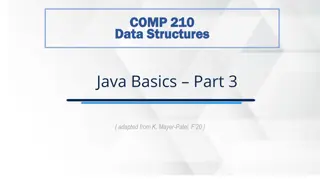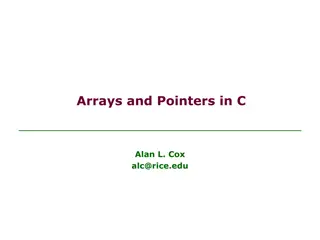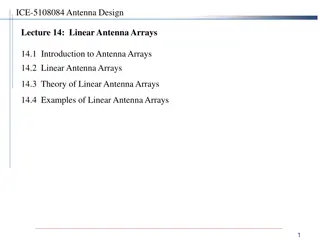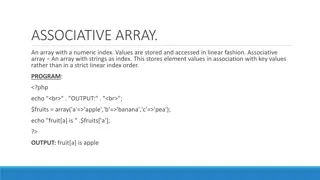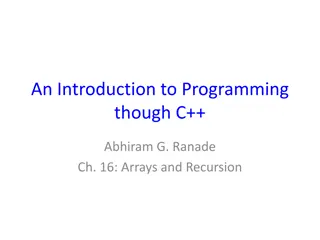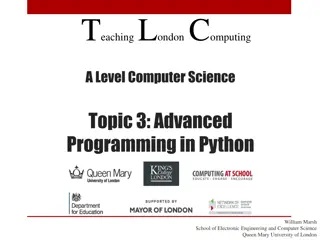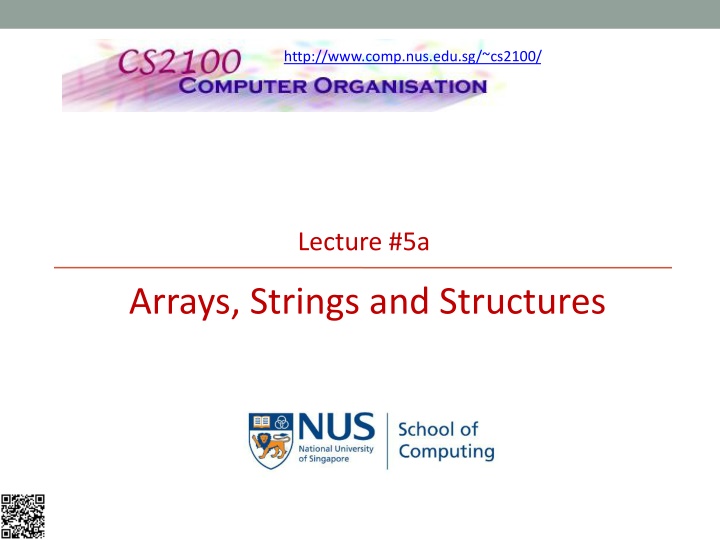
NUS CS2100 Lecture on Arrays, Strings, and Structures
"Explore the fundamentals of arrays, strings, and structures in C programming as covered in NUS CS2100 lecture series. Learn about organizing data, array manipulation, string operations, and structuring data for efficient processing."
Download Presentation

Please find below an Image/Link to download the presentation.
The content on the website is provided AS IS for your information and personal use only. It may not be sold, licensed, or shared on other websites without obtaining consent from the author. If you encounter any issues during the download, it is possible that the publisher has removed the file from their server.
You are allowed to download the files provided on this website for personal or commercial use, subject to the condition that they are used lawfully. All files are the property of their respective owners.
The content on the website is provided AS IS for your information and personal use only. It may not be sold, licensed, or shared on other websites without obtaining consent from the author.
E N D
Presentation Transcript
http://www.comp.nus.edu.sg/~cs2100/ Lecture #5a Arrays, Strings and Structures
Questions? IMPORTANT: DO NOT SCAN THE QR CODE IN THE VIDEO RECORDINGS. THEY NO LONGER WORK Ask at https://sets.netlify.app/module/676ca3a07d7f5ffc1741dc65 OR Scan and ask your questions here! (May be obscured in some slides)
Aaron Tan, NUS Lecture #5: Arrays, Strings and Structures 3 Lecture #5: Arrays, Strings and Structures (1/2) 1. Collection of Data 2. Arrays 2.1 2.2 2.3 2.4 2.5 Array Declaration with Initializers Arrays and Pointers Array Assignment Array Parameters in Functions Modifying Array in a Function 3. Strings 3.1 3.2 3.3 3.4 3.5 Strings: Basic Strings: I/O Example: Remove Vowels String Functions Importance of \0 in a String
Aaron Tan, NUS Lecture #5: Arrays, Strings and Structures 4 Lecture #5: Arrays, Strings and Structures (2/2) 4. Structures 4.1 4.2 4.3 4.4 4.5 4.6 4.7 4.8 4.9 4.10 Array of Structures 4.11 Passing Address of Structure to Functions 4.12 The Arrow Operator (->) Structure Type Structure Variables Initializing Structure Variables Accessing Members of a Structure Variable Example: Initializing and Accessing Members Reading a Structure Member Assigning Structures Returning Structure from Function Passing Structure to Function
Aaron Tan, NUS Lecture #5: Arrays, Strings and Structures 5 1. Collection of Data Besides the basic data types (int, float, double, char, etc.), C also provides means to organise data for the purpose of more logical representation and ease of manipulation. We will cover the following in this lecture: Arrays Strings Structures
Aaron Tan, NUS Lecture #5: Arrays, Strings and Structures 6 2. Arrays (1/2) An array is a homogeneous collection of data The declaration of an array includes the element type, array name and size (maximum number of elements) Array elements occupy contiguous memory locations and are accessed through indexing (from index 0 onwards) Example: Declaring a 30-element integer array c. int c[30]; Array size Element type Array name C[0] C[1] C[2] C[28] C[29] 10 21 14 20 42 7
Aaron Tan, NUS Lecture #5: Arrays, Strings and Structures 7 2. Arrays (2/2) ArraySumV1.c #include <stdio.h> #define MAX 5 Summing all elements in an integer array int main(void) { int numbers[MAX]; int i, sum = 0; printf("Enter %d integers: ", MAX); for (i=0; i<MAX; i++) { scanf("%d", &numbers[i]); } ArraySumV2.c #include <stdio.h> #define MAX 5 int main(void) { int numbers[MAX] = {4,12,-3,7,6}; int i, sum = 0; for (i=0; i<MAX; i++) { sum += numbers[i]; } for (i=0; i<MAX; i++) { sum += numbers[i]; } printf("Sum = %d\n", sum); return 0; } printf("Sum = %d\n", sum); return 0; }
Aaron Tan, NUS Lecture #5: Arrays, Strings and Structures 8 2.1 Array Declaration with Initializers As seen in ArraySumV2.c, an array can be initialized at the time of declaration. Note what happens when fewer initial values are provided. // a[0]=54, a[1]=9, a[2]=10 int a[3] = {54, 9, 10}; // size of b is 3 with b[0]=1, b[1]=2, b[2]=3 int b[] = {1, 2, 3}; // c[0]=17, c[1]=3, c[2]=10, c[3]=0, c[4]=0 int c[5] = {17, 3, 10}; The following initializations are incorrect: int e[2] = {1, 2, 3}; // warning issued: excess elements int f[5]; f[5] = {8, 23, 12, -3, 6}; // too late to do this; // compilation error
Aaron Tan, NUS Lecture #5: Arrays, Strings and Structures 9 2.2 Arrays and Pointers Example: int a[10] a[0] a[1] a[2] a[3] a[4] a[5] a[6] a[7] a[8] a[9] When the array name a appears in an expression, it refers to the address of the first element (i.e. &a[0]) of that array. int a[3]; printf("%p\n", a); printf("%p\n", &a[0]); printf("%p\n", &a[1]); These 2 outputs will always be the same. ffbff724 ffbff724 ffbff728 Output varies from one run to another. Each element is of int type, hence takes up 4 bytes (32 bits).
Aaron Tan, NUS Lecture #5: Arrays, Strings and Structures 10 2.3 Array Assignment (1/2) The following is illegal in C: ArrayAssignment.c #define N 10 int source[N] = { 10, 20, 30, 40, 50 }; int dest[N]; dest = source; // illegal! source[0] 10 source[9] 0 20 30 40 50 0 0 0 0 dest[0] ? dest[9] ? ? ? ? ? ? ? ? ? Reason: An array name is a fixed (constant) pointer; it points to the first element of the array, and this cannot be altered. The code above attempts to alter dest to make it point elsewhere.
Aaron Tan, NUS Lecture #5: Arrays, Strings and Structures 11 2.3 Array Assignment (2/2) How to do it properly? Write a loop: ArrayCopy.c #define N 10 int source[N] = { 10, 20, 30, 40, 50 }; int dest[N]; int i; for (i = 0; i < N; i++) { dest[i] = source[i]; } source[0] 10 source[9] 0 20 30 40 50 0 0 0 0 dest[0] 10 dest[9] 0 20 30 40 50 0 0 0 0 (There is another method use the <string.h> library function memcpy(), but this is outside the scope of this module.)
Aaron Tan, NUS Lecture #5: Arrays, Strings and Structures 12 2.4 Array Parameters in Functions (1/3) ArraySumFunction.c #include <stdio.h> int sumArray(int [], int); int main(void) { int val[6] = {44, 9, 17, -4, 22}; printf("Sum = %d\n", sumArray(val, 6)); return 0; } int sumArray(int arr[], int size) { int i, sum=0; In main(): val[0] val[1] 44 val[5] 0 for (i=0; i<size; i++) { sum += arr[i]; } return sum; } 9 17 -4 22 arr size In sumArray(): 6
Aaron Tan, NUS Lecture #5: Arrays, Strings and Structures 13 2.4 Array Parameters in Functions (2/3) Function prototype: As mentioned before, name of parameters in a function prototype are optional and ignored by the compiler. Hence, both of the following are acceptable and equivalent: int sumArray(int [], int); int sumArray(int arr[], int size); Function header in function definition: No need to put array size inside [ ]; even if array size is present, compiler just ignores it. Instead, provide the array size through another parameter. int sumArray(int arr[], int size) { ... } int sumArray(int arr[8], int size) { ... } Actual number of elements you want to process Ignored by compiler
Aaron Tan, NUS Lecture #5: Arrays, Strings and Structures 14 2.4 Array Parameters in Functions (3/3) Since an array name is a pointer, the following shows the alternative syntax for array parameter in function prototype and function header in the function definition int sumArray(int *, int); // fn prototype // function definition int sumArray(int *arr, int size) { ... } Compare this with the [ ] notation int sumArray(int [], int); // fn prototype // function definition int sumArray(int arr[], int size) { ... }
Aaron Tan, NUS Lecture #5: Arrays, Strings and Structures 15 2.5 Modifying Array in a Function (1/2) We have learned that for a function to modify a variable (eg: v) outside it, the caller has to passed the address of the variable (eg: &v) into the function. What about an array? Since an array name is a pointer (address of its first element), there is no need to pass its address to the function. This also means that whether intended or not, a function can modify the content of the array it received.
Aaron Tan, NUS Lecture #5: Arrays, Strings and Structures 16 2.5 Modifying Array in a Function (2/2) ArrayModify.c #include <stdio.h> In main(): void modifyArray(float [], int); void printArray(float [], int); num[0] num[1] 3.1 num[3] 8.8 5.9 -2.1 int main(void) { float num[4] = {3.1, 5.9, -2.1, 8.8}; modifyArray(num, 4); printArray(num, 4); return 0; } void modifyArray(float arr[], int size) { int i; arr size 4 In modifyArray(): 6.20 11.80 -4.20 17.60 void printArray(float arr[], int size) { int i; for (i=0; i<size; i++) { arr[i] *= 2; } } modifyArray() modifies the array; printArray() does not. for (i=0; i<size; i++) { printf("%.2f", arr[i]); } printf("\n"); }
Aaron Tan, NUS Lecture #5: Arrays, Strings and Structures 17 End of File

